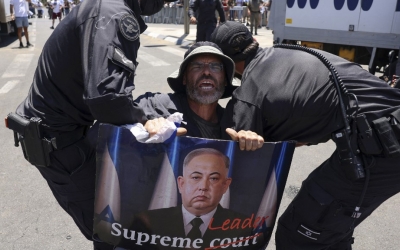Israel: Police to follow ‘the law’ as top court prepares for showdown with government

Israel's police chief has declared he will abide by the rule of law, amid concerns over a potential constitutional crisis if the government refuses to abide by an upcoming court ruling linked to its plans to overhaul the judiciary.
Commissioner Kobi Shabtai said on Wednesday that the law was the police’s only “guiding compass” and that forces under his command will always abide by it as long as he is the commissioner.
His comments come weeks before Israel's Supreme Court is scheduled to hear petitions against the Knesset passing a controversial law that critics say will reduce the judiciary’s oversight over the legislature.
If the law is struck down, it would be an unprecedented case of the court nullifying a quasi-constitutional Basic Law amendment passed by parliament.
Prime Minister Benjamin Netanyahu has refused to confirm if his government will comply with the court’s ruling, saying in a recent interview that he hopes “we won’t get to that”.
New MEE newsletter: Jerusalem Dispatch
Sign up to get the latest insights and analysis on Israel-Palestine, alongside Turkey Unpacked and other MEE newsletters
Members of his ultra-nationalist governing coalition have said they may not respect Supreme Court rulings that annul Basic Laws.
A refusal by the government to accept the court’s ruling could trigger a constitutional crisis in the country. Shabtai is the first security official to publicly suggest he would take the court’s side.
'If the situation comes to a constitutional crisis, I’ll be on the right side'
– David Barnea, Mossad chief
Last month, David Barnea, the chief of Israel’s intelligence agency, the Mossad, privately told staff that “if the situation comes to a constitutional crisis, I’ll be on the right side”, suggesting that his organisation would also stand by the Supreme Court.
In response to Shabtai’s comments on Wednesday, Israel’s far-right National Security Minister Itamar Ben-Gvir, to whom the commissioner answers, said the police must remain “apolitical”.
“The law and the principles of democracy teach us that the nation goes to the polls and whoever is elected has to dictate policy, and everyone has to follow this policy. That’s how it is in a democracy,” Ben-Gvir said.
Largest union vows action
Meanwhile, Arnon Bar-David, the chair of Israel's Histadrut Labour Federation, said that rejecting the Supreme Court’s ruling would “cross all lines”.
“We will not allow such a constitutional crisis to occur, and we will not sit on the sidelines,” Bar-David said on Wednesday.
But he stopped short of saying whether the country’s largest union would go on strike.
The Histadrut’s general strike in March, in protest against the government’s judicial overhaul, was in part responsible for pressuring Netanyahu to temporarily halt the controversial plan.
However, the premier’s coalition advanced a key bill in the judicial overhaul four months later, despite widespread protests.
The new law abolishes Israel's "reasonableness standard", eliminating the Supreme Court's ability to block government decisions it deems unreasonable.
It's part of a package of bills proposed by the coalition government earlier this year, as it seeks to overhaul Israel's judicial system.
Proponents of the plan say it is necessary to restore the balance of power between government branches, while opponents say it will remove checks and balances and undermine the independence of the judicial system.
Appeals have been lodged against the new law with the Supreme Court, which is set to convene all 15 judges on 12 September to hear the petitions.
Middle East Eye delivers independent and unrivalled coverage and analysis of the Middle East, North Africa and beyond. To learn more about republishing this content and the associated fees, please fill out this form. More about MEE can be found here.





